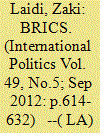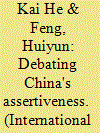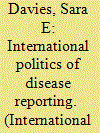| Srl | Item |
| 1 |
ID:
117026


|
|
|
|
|
| Publication |
2012.
|
| Summary/Abstract |
The BRICS' impact can be evaluated based on the degree of political coherence among them, as well as their capacity to influence the international system. This article will from the outset assume that the BRICS form a heterogeneous coalition of often competing powers that share a common fundamental political objective: to erode Western hegemonic claims by protecting the principle which these claims are deemed to most threaten, namely the political sovereignty of states. The BRICS form a coalition of sovereign state defenders. While they do not seek to form an anti-Western political coalition based on a counter-proposal or radically different vision of the world, they are concerned with maintaining their independence of judgment and national action in a world that is increasingly economically and socially interdependent. They consider that state sovereignty trumps all, including, of course, the political nature of its underpinning regimes. Thus, the BRICS - even the democratic ones - fundamentally diverge from the liberal vision of Western countries.
|
|
|
|
|
|
|
|
|
|
|
|
|
|
|
|
| 2 |
ID:
117027


|
|
|
|
|
| Publication |
2012.
|
| Summary/Abstract |
Engaging the recent debate on China's assertive foreign policy, we suggest that it is normal for China - a rising power - to change its policy to a confident or even assertive direction because of its transformed national interests. We argue also that it is better to understand future US-China relations as a bargaining process. Whereas China negotiates for a new status in the system with redefined interests, the United States and other countries need to adjust their old political practices. China's 'core interest' diplomacy launched in 2009 is the first step in revealing 'private information' for peaceful bargaining with the outside world. A status quo foreign policy is not a wise choice for the United States because of the changing power and interest configurations in the international system.
|
|
|
|
|
|
|
|
|
|
|
|
|
|
|
|
| 3 |
ID:
117024


|
|
|
|
|
| Publication |
2012.
|
| Summary/Abstract |
Since the 1990s, the notion of the 'failed state' has become a core organising concept in international, security and development idiom and practice. Although initially developed by policy networks, the proliferation of academic literature on 'failed states' accepts largely uncritically the accounts of foreign-policy makers, taking the notion of state failure entirely as given, as an unproblematic descriptive and analytical term. This article rejects such accounts, arguing that the concept of the 'failed state' remains essentially contested and under-theorised. In particular, the term immediately embodies a set of assumptions that obfuscate any serious understanding of the causes of social conflict and crisis. The article interrogates the concept of the 'failed state', the assumptions from which the thesis of 'state failure' is derived, its ideological character and integral relation to the history and current order of imperialism. The article does not refute the prevalence of social crises; rather, it contends that the notion of the 'failed state' is descriptively weak and analytically inadequate in furthering an understanding of the causes and conditions of such crises. Moving beyond critique, the article outlines a more adequate methodological, theoretical and substantive approach to analysis and explanation of social crises, centring on the structures and practices of imperialism.
|
|
|
|
|
|
|
|
|
|
|
|
|
|
|
|
| 4 |
ID:
117025


|
|
|
|
|
| Publication |
2012.
|
| Summary/Abstract |
Since the outbreak of Severe Acute Respiratory Syndrome (SARS) in 2003, there has been much discussion about whether the international community has moved into a new post-Westphalian era, where states increasingly recognize certain shared norms that guide what they ought to do in responding to infectious disease outbreaks. In this article I identify this new obligation as the 'duty to report', and examine competing accounts on the degree to which states appreciate this new obligation are considered by examining state behaviour during the H5N1 human infectious outbreaks in East Asia (since 2004). The article examines reporting behaviour for H5N1 human infectious cases in Cambodia, China, Indonesia, Thailand and Vietnam from 2004 to 2010. The findings lend strong support to the claim that East Asian states have come to accept and comply with the duty to report infectious disease outbreaks and that the assertions of sovereignty in response to global health governance frameworks have not systematically inhibited reporting compliance.
|
|
|
|
|
|
|
|
|
|
|
|
|
|
|
|
| 5 |
ID:
117023


|
|
|
|
|
| Publication |
2012.
|
| Summary/Abstract |
President Barack Obama's choice of toughened sanctions as the means to prevent Iran achieving nuclear weapons status is discussed. It is argued that that choice is explained less by any belief in their likely effectiveness than by the unattractive and risky nature of the alternatives. The use of force would not eliminate Iran's nuclear programme and risks pitching the region into even deeper turmoil; the 'Grand Bargain' with Iran advocated by others would alienate allies and domestic interests and undermine the administration's wider objectives in the Middle East. The attraction of sanctions, in contrast, is that though unlikely to work they pose little threat to US interests while allowing the Obama administration to stave off demands to adopt high risk alternatives and creating a breathing space for the administration to consider the future evolution of its Iran policy.
|
|
|
|
|
|
|
|
|
|
|
|
|
|
|
|